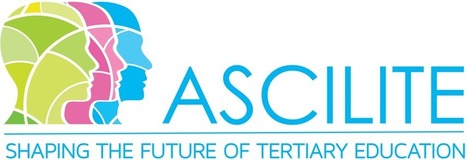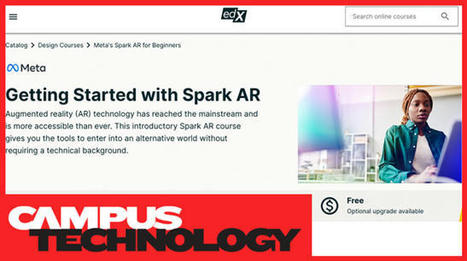 Your new post is loading...
 Your new post is loading...
1000s of courses with free certificates and badges from universities, companies, and nonprofits worldwide.
It’s free, self-paced and highly recommended for anyone in their first few years of university teaching.
Futurelearn accounts read like the script of a disaster movie. Nearly 10 years I wrote a piece questioning their choice of CEO (he cam
The tech giant Meta, widely known under its previous name Facebook, seems to be eyeing a way to allow users to offer video classes. Since at least las
Universities will also need to carefully consider the relative merits of housing courses on, and offering them via a MOOC platform as opposed to doing this themselves. Whilst it’s easy to make a fairly unsophisticated argument that going it alone means not incurring any 3rd party costs, HEIs need to conduct a cost benefit analysis in reference to their strategy to come to sound decisions.
It’s also worth noting that this doesn’t need to be an either/or decision, in fact a horses for courses approach could be effective, especially where institutions are confident in reaching and recruiting from the target audience themselves and where they have a strong online learning proposition already.
In essence what characterises all of this advice is deliberate, strategic, well-informed and thought-through decision making in relation to MOOC platform partnerships. Some universities have not always been very rigorous in this respect.
Nevertheless, as we enter a new era for online education, one in which there seems to be more universities developing partnerships to offer an online portfolio of courses, it will be interesting to observe whether MOOC platform partnerships will play a role in that and what this ultimately begins to look like.
Forum discussions have been utilised widely as a means of facilitating learning interaction and social-knowledge construction in online learning. Much research has been conducted on the instructional interventions that benefit asynchronous discussions. Role-playing, or assigning roles to discussants, has been proven effective in promoting interactivity and knowledge construction in the context of both face-to-face and online learning. However, assigning and rotating roles to thousands of learners in massive open online courses (MOOCs) and preparing them to act properly in their roles sounds impractical to MOOC instructors due to work overload. The present study provided three types of role assignment in a MOOC during various course offerings: fall offerings with no role-assignment, spring offerings with partial role-assignment and summer offerings with full role-assignment. Through the examination of the discussion patterns and role-assignment differences among 4,239 students and 5,439 posts in 56 forums, we suggest that partial role-assignment is as effective as full-role assignment. By assigning as few as 10 students with rotating roles, MOOC instructors can leverage this effective strategy while minimising their effort in preparing the discussants and moderating the discussions. These students act behind the scenes and improve the behavioural patterns of asynchronous discussions.
In 2021, two of the biggest MOOC providers had an “exit” event. Coursera went public, while edX was acquired by the public company 2U for $800 million and lost its non-profit status.
Ten years ago, more than 300,000 learners were taking the three free Stanford courses that kicked off the modern MOOC movement. I was one of those learners and launched Class Central as a side-project to keep track of these MOOCs.
Now, a decade later, MOOCs have reached 220 million learners, excluding China where we don’t have as reliable data, . In 2021, providers launched over 3,100 courses and 500 microcredentials.
In March, Coursera went public on the NYSE, raising $519 million. Since then, its stock price has been steadily falling even though revenue has been increasing. The company is expected to bring in more than $400 million in revenue in 2021. But it has yet to turn a profit, and it is on track to lose well over $100 million.
|
Explore an innovative approach to teaching and learning using educational technologies to improve online learning opportunities with this online course from the University of Southern Queensland.
EdX has launched two Spark Augmented Reality courses from Meta, developed as part of the online learning platform's partnership with Meta Immersive Learning. The goal: to "build a learning ecosystem for the metaverse and give professionals broader access to the tools and education needed to build a career in augmented reality."
When Massive Open Online Courses (MOOCs) were first introduced about a decade ago, many higher education professionals viewed this new arrival as
In 2015 I converted my introductory astronomy course ASTR1001 into a set of MOOCs (Massive Open Online Courses) and released them for free to everyone in the world. They have been running ever since to rave reviews and have been taken by 400,000 plus students: more than the ANU has graduated in its entire history.
But the real surprise was when we offered a version of these MOOCs to our on-campus students. I hadn’t imagined that any on-campus student would want to take a purely online course. But, in fact, our enrolment increased eightfold, and the SELT evaluations were spectacular. Why? Partly because these online courses are self-paced and asynchronous i.e. students can watch the videos and do the homework to their own schedule. This is valuable to students who need to support themselves by working. It also means that we can offer these courses multiple times per year – including the winter/summer semesters; popular sessions for students who need to replace a failed unit or catch up on underloading.
Article: JIME Virtual Special Collection – 2012 to 2022: The Decade of the MOOC
|
 Your new post is loading...
Your new post is loading...
 Your new post is loading...
Your new post is loading...



















